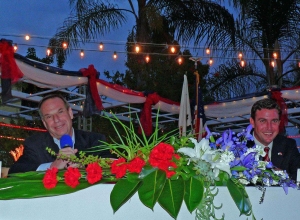 By Miriam Raftery
By Miriam Raftery
August 25, 2009 (Rancho San Diego/El Cajon)—The setting was serene, but the political exchanges were rocky at “Politics in Paradise,” a community legislative forum sponsored by the San Diego East County Chamber of Commerce Friday evening at Cuyamaca College’s Water Conservation Garden.
“Welcome to East County’s first town hall yelling match on healthcare reform,” emcee Barry Jantz quipped, though the forum covered a broad range of issues. Congressmen Bob Filner D-San Diego) and Duncan Hunter (R-Alpine) took center stage (photo, above) in a rare dual appearance, along with Assemblyman Joel Anderson (R-Alpine) and supervisor Diane Jacob. (Assemblyman Marty Block (D-Lemon Grove) and State Senator Denise Ducheny (D-San Diego) were unable to attend the evening of impassioned discussion about issues impacting East County businesses and residents.
HEALTHCARE: A PAINFUL POINT OF CONTENTION
Filner led off by tempting his partisan opposite. “Who’s against socialized medicine?” he asked as predictably, many hands shot up. Then he countered, “Of those with your hands raised, how many have gone for treatment at the V.A. (Veterans Administration)?” Glancing at Hunter, whose hand was raised, Filner shot off, “Why, Duncan, that’s government-run healthcare.” In a later question, the Democratic Congressman said he supports universal access to healthcare as a right for all Americans and supports cost controls to rein in the soaring costs of medical treatment.
Hunter responded that he believes there are ways to fix the system without getting rid of insurance companies. He said he wouldn’t trust government to handle healthcare when “they can’t get cash for clunkers working.” He opposes any public option or universal access but would support changes to make private health insurance more portable and transparent. “Reform the system, don’t crush it,” he said.
GLOBAL WARMING MELTDOWN
Asked about global warming, the Congressional members reached a near boiling point.
Hunter ridiculed the notion that climate change needs to be addressed by Congress. “Nobody really knows the cause,” he said. “The earth cools, the earth warms…It could be caused by carbon dioxide or methane. Maybe we should kill the cows to stop the methane, or stop breathing to stop the CO2…Thousands of people die every year of cold, so if we had global warming it would save lives…We ought to look out for people. The earth can take care of itself.”
Filner took a polar opposite approach. “The science is clear. Global warming is here,” he warned. “In the interest of our species we need to take action. By all calculations, in California if the seas rise, we are in trouble.” He noted that Hunter’s father, the senior Duncan Hunter, chaired the House Armed Services Committee and was a key ally of the Pentagon in Congress. “The Pentagon is doing a study to see if the seas rise and we run out of water, what do we do? They accept global warming as fact,” Filner said. “We can do some things to deal with climate change. We can get beyond fossil fuel dependence. It will create jobs…we can make changes so our children and grandchildren will be here and have a good environment in the future.”
He chided Hunter for making decisions based on religion, not scientific evidence. “This country is based on science,” he said. “Do we as a species progress through scientific understanding? If we give that up, we’re dead as a nation.”
Hunter countered by suggesting that believers in global warming must not believe in God, then added, “If we give up God, we’d be dead as a nation.”
SPARRING OVER NATIONAL DEFENSE
Noting that Republicans are forty seats down from a majority in the House, Hunter observed, “We can’t stop anything right now.” But he pledged to make national defense a priority and voiced concerns over cutting the defense budget for the first time during a time of war. He also called for more border security and voiced opposition to any amnesty plan for unlawful immigrants. “Half the money spent for cash for clunkers would support a missile defense program,” he said, adding that spending 2 to 3 percent less a year on Defense could mean cutting missile defense and shipbuilding. Hunter also criticized Democrats for raising the national debt.
Filner said both he and Hunter favor a 300-ship Navy and that both serve on a shipbuilding committee. “As a Democrat, I’m equally concerned about debt,” he said, adding that the Bush administration built up record debt in the past eight years on war, bank bailouts and more and the Obama administration has increased the debt further with stimulus funds. Filner voted against the Bush bailouts but for the Obama stimulus plan, he noted. But he defines national security broadly to include more than only military defense. “My district thinks national security means having a job, being able to send your kids to college so you can participate in the economy, having a clean environment and having healthcare. That makes them feel secure,” he said.
ENERGY ISSUES SPARK HEATED REMARKS
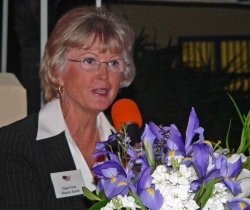 Supervisor Jacob (photo, left) issued a strong call for development of alternative energy sources and spoke forcefully against Sunrise Powerlink (a project supported by the Chamber). “The 11,000 page environmental impact report is the largest in California history and it clearly stated that Powerlink is not needed,” she said.
Supervisor Jacob (photo, left) issued a strong call for development of alternative energy sources and spoke forcefully against Sunrise Powerlink (a project supported by the Chamber). “The 11,000 page environmental impact report is the largest in California history and it clearly stated that Powerlink is not needed,” she said.
Jacob called for clean alternatives but added that energy needs must be balanced to suit the location and weigh environmental issues when considering projects such as wind turbine farms. She called for more small-scale turbines as well as finding ways to increase solar energy. “We should allow at the County level to be energy independent and self sufficient,” said Jacob, who wants to see financing to help people and businesses afford the up-front cost of solar and ultimately, sell excess power back to the power grid. She called for “solar on every roof” but added that any laws at the state level should include a cost-benefit analysis to avoid “job killer” proposals.
Anderson called for a balanced approach utilizing more solar and wind where such alternatives make sense, but added, “If we put mandates on companies to have green energy, we’ve got to give them the tools to get there.” He expressed doubts about global climate change but noted that “there’s a lot we can do that makes economic sense,” praising a recent project built by Hammond Companies and Sempra Energy. “It’s one of the most efficient buildings in the city and it’s cost effective—it will pay for itself,” said Anderson, who added that he prefers to see the private sector create green, efficient buildings without mandates from the government.
Hunter expressed opposition to more overhead electric transmission lines such as Powerlink and said undergrounding lines is “totally doable.” But he said wind is less efficient than some other energy sources, such as nuclear, which he supports, along with offshore drilling. “I prefer to go out in the backcountry and hunt and hike and not see power lines,” he said.
A heckler interrupted Filner to demand nuclear power. Filner retorted, “Fine, if we put in your backyard so your kids can play in the nuclear waste.”
Filner, whose districts includes Imperial County as well as southern portions of East County and the South Bay, revealed that he just put together “Project Sol” to make San Diego and Imperial Counties “the energy capital of the nation.” He said he just completed meetings with community leaders as well as heads of irrigation and water districts in Imperial County “to get them all singing from the same prayer book” in terms of design criteria, economic incentives and tourism incentives. He invited Jacob to join with him in organizing similar sessions here, adding, “It’s the way of the future.” He termed Sunrise Powerlink the “Desert Deathlink” link but acknowledged that some transmission lines will be necessary to transmit green energy as our nation transitions to a cleaner, sustainable economy.
BARBS OVER GOVERNMENT SPENDING
Jacob noted that she recently visited a SPAWAR facility in San Diego where strides are being made toward achieving cold fusion. “If our government will invest millions for the next step, we could see a suit-cased size cold fusion unit that could power our whole house,” she added.
Filner, who founded the Cold Fusion Caucus in Congress, chided Jacob, who had previously voiced concerns over government spending. “So there is a role for the federal government to partner in this?” he asked Jacob, who nodded, then said Congress should invest in projects such as fusion instead of “wasting money on stimulus projects.”
Asked about funding the fusion project for San Diego, Hunter replied, “I don’t want to spend $100 million on anything right now. Our debt is so massive, it’s inconceivable.”
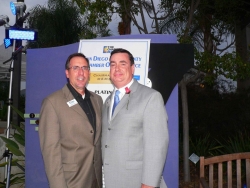 Anderson quipped, “Everything in the state’s going well by contrast.” But he criticized the state Legislature for failing to balance the budget and urged public support for his AB 1506, a bill that would require the state to accept its own IOUs. (See our story on this bill: “http://www.eastcountymagazine.org/?q=node/1787)
Anderson quipped, “Everything in the state’s going well by contrast.” But he criticized the state Legislature for failing to balance the budget and urged public support for his AB 1506, a bill that would require the state to accept its own IOUs. (See our story on this bill: “http://www.eastcountymagazine.org/?q=node/1787)
“Our state is at a crossroads. It’s about jobs and the economy,” said Anderson, who opposes any tax increases and wants to make California more business-friendly to prevent companies from leaving the state. (photo, right: moderator Barry Jantz and Assemblyman Joel Anderson)
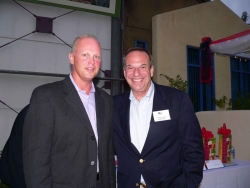 Since no Democrats in the Legislature were able to attend the forum, the moderator allowed Filner to comment on the Democratic perspective to the state budget crisis. “What’s outrageous is the two-thirds vote requirement,” he said, referring to state law requiring a super-majority to pass a budget or any tax increases, something only two other states require. “A few extremists can block any budget. Change the two-thirds rule and you won’t need Joel’s bill.”
Since no Democrats in the Legislature were able to attend the forum, the moderator allowed Filner to comment on the Democratic perspective to the state budget crisis. “What’s outrageous is the two-thirds vote requirement,” he said, referring to state law requiring a super-majority to pass a budget or any tax increases, something only two other states require. “A few extremists can block any budget. Change the two-thirds rule and you won’t need Joel’s bill.”
photo, left: Chamber president Brian Gray with Congressman Bob Filner)
Anderson later said he opposes a Constitutional Convention to change the two-thirds rule. He faulted the state for spending money based on projected revenues that sometimes don’t materialize.
Jacob noted that the County is feeling the impact of budget cuts at higher levels. “What happens at the state and federal level, everything runs downhill,” she said, but added that the County government is strong and has had its bond rating restored. “We don’t spend more than we take in,” she said, noting that the County has fewer employees than in 2003 and has made adjustments to some pensions.
She predicted that another $155 million will be cut from County spending. “These cuts are difficult, and they are related to the state budget cuts,” said Jacob, who foresees job layoffs, outsourcing, and more use of technology to balance the budget.
Jacob agreed that the state has a spending problem not a revenue problem, i.e. spending more than it takes in, but suggested counties will go to the people with initiatives seeking reforms to let counties regain control over funds that have been commandeered by the state. “We need to take back control to the people.”
WILDFIRES: A FIERY TOPIC
“Thank God for the weather,” Jacob said on this drizzly day. She then set out to clarify “misinformation”, noting that the County region spends about $450 million on structural fire protection and emergency medical services annually, excluding money spent by CAL-FIRE or the U.S. Fire Service. [Editor’s note: that figure does, however, include funds spent by cities within the County.]
The County has spent $180 million since the Cedar Fire upgrading emergency responses and a reverse 911 system, adding two helicopters, 30 engines, and contracted large aerial support capable of carrying more water than super-scoopers. The County has also moved to form a County Fire Authority, resulting in “50 stations in the backcountry that were all volunteer and are now manned 24/7,” Jacob said. “Our goal is to put those fires out in early stages.”
Public safety should be a first priority at all levels of government, Jacob said.
WEIGHING IN ON THE WATER SHORTAGE
Officials were asked how to balance growth against the water shortage.
Jacob said the County looks to water districts to recommend whether they can support new development with water services or not.
Hunter said he inserted an earmark to create a $250 million aqueduct that would serve as its own reservoir. “We have water flowing…it’s a matter of how much we can hold and keep here,” he said. Hunter also criticized a court ruling to protect the delta smelt and limit water pumping. “We’re getting nailed because of a stupid fish.”
Anderson, a former Padre Water District board member, said the state was close to signing a water deal last year. He faulted Democrats for using an “enviro-attorney” and said that until “L.A. wakes up with higher water rates” there will not be enough votes in Sacramento for a project to deliver water to California. He calls for a Peripheral Canal type of project, noting it would take years to build even if approved.
Filner stressed the need to balance preserving environment with making sure people have enough water. “We’ve got to conserve,” he said, adding that more supplies are also needed. “We’ve got to do desalinization.” Filner also supports recycling water and denounced critics who dub such proposals `toilet to tap.’ “As a chemist by training,” said Filner, who holds a B.A. in chemistry from Cornell University, “I can tell you that you can drink it. It’s better than the Colorado River is now.”
BACKCOUNTRY REVITALIZATION--INCLUDING A "VINE" PROPOSAL
Asked about efforts to promote backcountry revitalization, Jacob said she has formed an economic revitalization group. “One thing we’re trying to promote is the wine industry in East County,” she revealed. A new ordinance would let boutique wineries “enter into retail by right” and is now undergoing an environmental impact review, she disclosed, adding, “and who doesn’t like to drink wine?”
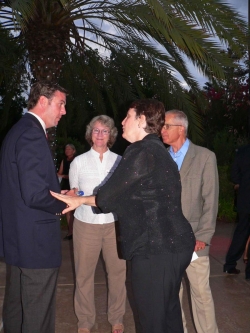
Hunter said economic development is the most important priority, more than healthcare. “My job is to get government off your back and remove economic burdens,” he said, adding that his office will host a job fair September 2nd in El Cajon(See our calendar for details). “The most important things we can do as your representatives is to make sure you have a job and can take care of your family.” (photo: Hunter speaks with backcountry community leaders Donna Tisdale and Diane Conklin)
Filner said he is working with people in the backcountry on ways to improve infrastructure and said that any help the federal government can provide for alternative energy “will be a great help here.” But he noted, “You don’t want to destroy what makes the backcountry special…Desert Deathlink doesn’t make sense,” he said in a reference to the fire dangers posed by Sunrise Powerlink.
He noted that community colleges will produce a work force for the green economy. “We need to make sure they are not hurt by what’s going on in the state, and that they can do the job,” he said.
CLOSING COMMENTS
Jacob called for changes to allow local governments more flexibility to make local decisions on how to spend taxpayer dollars. She criticized state and federal government spending, but praised federal expenditures on Operation Stonegate to beef up border security following murder of a Border Patrol agent in East County. “Threat is real, and we need the help,” she said.
Anderson said the state needs to stop trying to borrow its way out of debt. “I’m trying hard to make sure the state lives within its means,” he said.
Hunter praised Filner for his service as Chair of the Veterans Affairs Committee. “He does a great job taking care of our men and women coming home,” he said, adding that Filner also gained support of leadership to pass a measure honoring slain Border Patrol Agent Robert Rosas. “We disagree on a lot of stuff, but we can work together on some things,” he concluded.
Filner said many issues are complex, and noted that the diverse views on this panel reflect the fact that each legislator is striving to reflect his or her own constituents. “What we get is respect for each other,” he noted, but added that he also supports President Obama’s right to put forward his agenda including healthcare, following Obama’s electoral victory and the Democrats regaining control of the Senate. “We do have a majority,”he said, “and I hope we can reflect the changes people want.”









Comments
Only the wealthy went
It was a shame my wife and I did not have the $100.00 fee required to go to this affair. When are they going to have a get together where their employers, us taxpayers, can get to them without paying a bribe to the chamber?
By the way, the latest big lie is the County Fire Authority, AKA the big joke. Don't believe me? Ask any firefighter or fire company who has had to deal with them over the past 14 months.
Politics in Paradise
Ms. Raftery,
Congradulations on your summation of the Friday night ringside called "Politics in Paradise." Your story is knock-out in journalism. It is succinct, fair and impartial, not an easy tightrope walk in such a tense atmosphere.
I don't believe I have ever seen both Duncan Junior and Bob Filner on the stage together ever. Hunter Junior in particular seemed uncomfortable having a Democrat in his District.
Filner deserves the Medal of Courage just for being there in front of the decidedly partisan crowd and with the crowd and the panel stacked against him a Championship Belt for going toe-to-toe with Duncan Junior (who by the way is just a rookie in the first year of his first term as a United States Congressman).
I had a ringside seat at the event and I really expected Junior to be a bit more humble. Instead, he came out swinging like a religious zealot, a demigod with a chip on his shoulder. It was unnerving and uncalled for.
We all wish the Junior, Junior ever-so-junior Congressman all the best as our representative to the U.S. Congress.
That's the way I score it.
Thank you Ms. Raftery, your blow-by-blow is top quality. Keep up the good work.